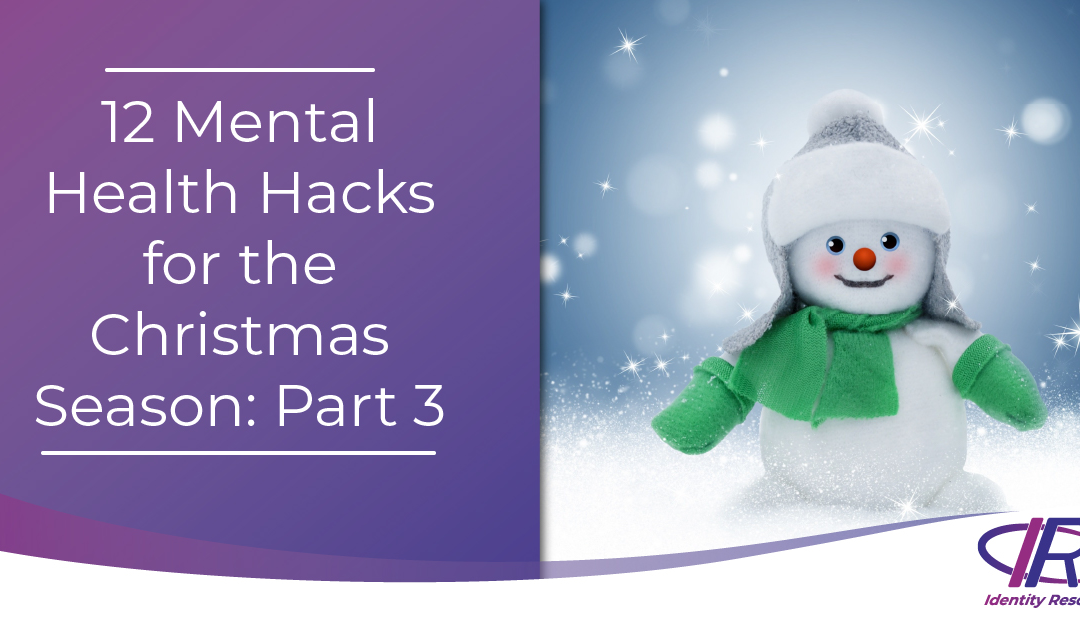In our third and final blog in our series, we’ll share our tips that will help you to manage your thoughts and emotions. You can catch up on our earlier blogs where we looked at how structure and awareness can help you:
12 Mental Health Hacks for the Christmas Season: Part 1
12 Mental Health Hacks for the Christmas Season: Part 2
What have you put in place to manage your time and prevent overload? How do you feel about the changes that you have made? And do you understand yourself, your thoughts, and emotions a little better? With a structure and an improved understanding of yourself do you feel that you can manage negative thoughts and emotions more effectively with the right tools?
Table of Contents
Managing Your Mental Health at Christmas

While the Christmas period brings feelings of happiness and celebration to many people, it can also have a negative impact on our mental health. It is likely that we’ve all felt a bit stressed or over…
Mental Health Hacks for Managing Jumbled Thoughts and Emotions
1. Don’t judge yourself
It’s all too easy to judge ourselves- in negative ways. Are we good enough? Do we measure up? Will I be liked? And that can have a devastating impact on our self-esteem, our self-worth, and confidence. And often these judgements are not based on fact but incorrect, emotional assessments. Don’t judge your thoughts and emotions. Try and free yourself from negative self-judgement.
2. Be resourceful and creative
Add innovation to this as well. Approaching challenges with a problem-solving mindset will enable you to resolve many of your challenges and move on. And that means being resourceful and creative in your responses. Try and think of solutions to problems in a way that focuses on a positive outcome. Or to put it another way, treat a challenge as an opportunity. Freeing your mind to allow it to create solutions can in itself be freeing. How do you feel about this approach? Could it work for you, and how do you think you would feel if you could allow your mind to come up with solutions?
3. Be open-minded
A closed mind rarely learns, is often negative, and usually unhappy. That individual may not be aware of these things either. Be accepting of new ideas, and of other opinions and solutions. If you open your mind to new concepts could you apply something different to your challenges? There’s judgement here too. If you make a judgement is that the behaviour of an open mind or a closed one? Consider whether your mind is truly open or not. How could you change the way you approach problem-solving?
4. Calm your mind
This is probably the most difficult of our tips to achieve. There are different ways to be calm. Meditation and mindfulness are two ways. Meditation is a technique where you narrow your focus and concentrate on one thing. That could be your breathing or a point in front of you. When you wander you bring your focus back to your focal point. That allows you to clear your mind through controlled breathing and relaxation. Mindfulness is a slightly different relaxation technique. You pay attention to everything around you to keep you in the present. So you’ll be aware of sound, movement, colour, texture, and so on. Try them both to see which one you prefer. Could you set aside a few minutes each day to practice your preferred technique? Not got the time? Have a look a the weekly usage on your mobile phone. Could you take 10 minutes a day away from your phone and apply it here?
What about Mobile Phones?
We’ve mentioned mobile phones in Part 2 and Part 3 of this blog series. But why? There is a good reason. The speed we live our lives at has impacted mental health for many people. And one of those modern conveniences is mobile phones. Take a look at this blog for information on how mobile phones can affect us.
What Next?
We’ve put together our three-part series for the festive season to give you some food for thought when it comes to dealing with negative thoughts and emotions, stress, and anxiety. And what better time than at Christmas when research shows that many people suffer mental health issues now than at any other time of the year.
We’re here to support your journey to discovering the best version of you and developing a positive mindset.
Get in touch to find out more about our support and services.

Recent Comments